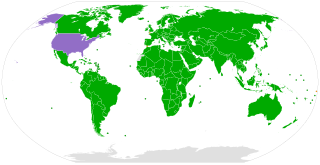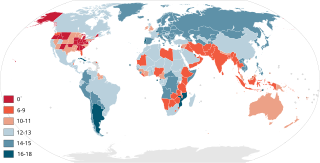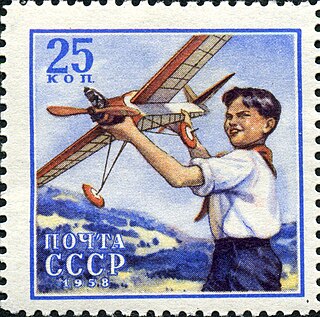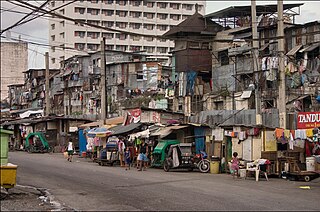Related Research Articles

The United Nations Convention on the Rights of the Child is an international human rights treaty which sets out the civil, political, economic, social, health and cultural rights of children. The convention defines a child as any human being under the age of eighteen, unless the age of majority is attained earlier under national legislation.

Children in the military, including state armed forces, non-state armed groups, and other military organizations, may be trained for combat, assigned to support roles, such as cooks, porters/couriers, or messengers, or used for tactical advantage such as for human shields, or for political advantage in propaganda. Children have been recruited for participation in military operations and campaigns throughout history and in many cultures.

A child (pl. children) is a human being between the stages of birth and puberty, or between the developmental period of infancy and puberty. The term may also refer to an unborn human being. In English-speaking countries, the legal definition of child generally refers to a minor, in this case as a person younger than the local age of majority, regardless of their physical, mental and sexual development as biological adults. Children generally have fewer rights and responsibilities than adults. They are generally classed as unable to make serious decisions.

The age of criminal responsibility is the age below which a child is deemed incapable of having committed a criminal offence. In legal terms, it is referred to as a defence/defense of infancy, which is a form of defense known as an excuse so that defendants falling within the definition of an "infant" are excluded from criminal liability for their actions, if at the relevant time, they had not reached an age of criminal responsibility. After reaching the initial age, there may be levels of responsibility dictated by age and the type of offense committed.

Children's Day is a commemorative date celebrated annually in honour of children, whose date of observance varies by country. In 1925, International Children's Day was first proclaimed in Geneva during the World Conference on Child Welfare. Since 1950, it is celebrated on 1 June in many countries, which follow the suggestion from Women's International Democratic Federation. World Children's Day is celebrated on 20 November to commemorate the Declaration of the Rights of the Child by the UN General Assembly on 20 November 1959. In some countries, it is Children's Week and not Children's Day. The Sikhs celebrate Children Day on 20 December to 27 December.
The United Nations World Summit for Children was held in the United Nations Headquarters in New York City on 29–30 September, 1990. The summit had the then-largest-ever gathering of heads of state and government to commit to a set of goals to improve the well-being of children worldwide by the year 2000. It was the first time a UN conference had set a broad agenda for a wide range of goals in health, education, nutrition and human rights.
Children's rights or the rights of children are a subset of human rights with particular attention to the rights of special protection and care afforded to minors. The 1989 Convention on the Rights of the Child (CRC) defines a child as "any human being below the age of eighteen years, unless under the law applicable to the child, majority is attained earlier." Children's rights includes their right to association with both parents, human identity as well as the basic needs for physical protection, food, universal state-paid education, health care, and criminal laws appropriate for the age and development of the child, equal protection of the child's civil rights, and freedom from discrimination on the basis of the child's race, gender, sexual orientation, gender identity, national origin, religion, disability, color, ethnicity, or other characteristics.

The Optional Protocol to the Convention on the Rights of the Child on the Involvement of Children in Armed Conflict (OPAC), also known as the child soldier treaty, is a multilateral treaty whereby states agree to: 1) prohibit the conscription into the military of children under the age of 18; 2) ensure that military recruits are no younger than 16; and 3) prevent recruits aged 16 or 17 from taking a direct part in hostilities. The treaty also forbids non-state armed groups from recruiting anyone under the age of 18 for any purpose.

Trafficking of children is a form of human trafficking and is defined by the United Nations as the "recruitment, transportation, harboring, and/or receipt" kidnapping of a child for the purpose of slavery, forced labour, and exploitation. This definition is substantially wider than the same document's definition of "trafficking in persons". Children may also be trafficked for adoption. Not all adoption is a form of human trafficking, but illegal or informal is. Illegal adoptions violate multiple child rights norms and principles, including the best interests of the child, the principle of subsidiarity and the prohibition of improper financial gain.

The Committee on the Rights of the Child (CRC) is a body of experts that monitor and report on the implementation of the United Nations Convention on the Rights of the Child.

Human rights in Somalia throughout the late 20th-century and early 21st-century were considered dire, but have gradually improved over the following years. Human rights are guaranteed in the Federal Constitution, which was adopted in August 2012. They fall under the Ministry of Human Rights established in August 2013. The central authorities concurrently inaugurated a National Human Rights Day, endorsed an official Human Rights Roadmap, and completed Somalia's first National Gender Policy.
Evolving capacities is the concept in which education, child development and youth development programs led by adults take into account the capacities of the child or youth to exercise rights on their own behalf. It is also directly linked to the right to be heard, requiring adults to be mindful of their responsibilities to respect children's rights, protect them from harm, and provide opportunities so they can exercise their rights. The concept of evolving capacities is employed internationally as a direct alternative to popular concepts of child and youth development.

The phenomenon of street children in the Philippines was first attested in the 1980s. As of 2021 the number of street children in the Philippines is estimated at around 250,000.
The timeline of children's rights in the United Kingdom includes a variety of events that are both political and grassroots in nature.
UNICEF, originally the United Nations International Children's Emergency Fund, officially United Nations Children's Fund since 1953, is an agency of the United Nations responsible for providing humanitarian and developmental aid to children worldwide. The organization is one of the most widely known and visible social welfare entities globally, operating in 192 countries and territories. UNICEF's activities include providing immunizations and disease prevention, administering treatment for children and mothers with HIV, enhancing childhood and maternal nutrition, improving sanitation, promoting education, and providing emergency relief in response to disasters.

UNICEF UK, also known as the United Kingdom Committee for UNICEF, is one of 36 UNICEF national committees based in industrialised countries. The national committees raise funds for the organisation's worldwide emergency and development work.
Child pornography is illegal in most countries, but there is substantial variation in definitions, categories, penalties, and interpretations of laws. Differences include the definition of "child" under the laws, which can vary with the age of sexual consent; the definition of "child pornography" itself, for example on the basis of medium or degree of reality; and which actions are criminal. Laws surrounding fictional child pornography are a major source of variation between jurisdictions; some maintain distinctions in legality between real and fictive pornography depicting minors, while others regulate fictive material under general laws against child pornography.
The Global Movement for Children (GMC) is the world-wide movement of organisations and people – including children- uniting efforts to build a world fit for children.

Armenia was admitted into the United Nations on 2 March 1992, following its independence from the Soviet Union. In December 1992, the UN opened its first office in Yerevan. Since then, Armenia has signed and ratified several international treaties. There are 20 specialized agencies, programs, and funds operating in the country under the supervision of the UN Resident Coordinator. Armenia strengthened its relations with the UN by cooperating with various UN agencies and bodies such as the International Monetary Fund, the World Bank, the World Food Programme, and with the financial institutions of the UN. Armenia is a candidate to preside as a non-permanent member of the UN Security Council in 2031.
Protection of children’s rights is guaranteed by the Constitution of the Republic of Azerbaijan and a number of other laws. Children’s rights embrace legal, social and other issues concerning children.
References
- "Key documentation for Canada's NPA". Government of Canada. Archived from the original on 19 November 2005. Retrieved 27 February 2014.
- "Special Session on Children - UNICEF". unicef.org. Retrieved 2014-02-16.
- "Convention on the Rights of the Child". UNICEF. Archived from the original on 15 September 2004. Retrieved 27 February 2014.